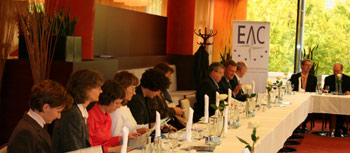
In a combined effort to commemorate UN Day, and also increase its visibility and enhance its contacts database in Slovakia, UNIS Vienna held a round table discussion, to hear what our Slovak partners find useful. The keynote speech was delivered by Ambassador Marcel Peško, Slovak Ministry of Foreign Affairs, on UN reform, and on security sector reform. The event was held in Bratislava, Slovakia on 24 October and the topic of discussion corresponded to an issue on which Slovakia has taken the lead in the Security Council and will be active in its Presidency in February 2007. The event was held in partnership with the Euro-Atlantic Center EAC) and the Slovak Atlantic Commission (SAC).

The event had two speakers: Nasra Hassan, Director, UNIS Vienna, who chaired and moderated the event and Ambassador Marcel Peško, Director of UN Department, Ministry of Foreign Affairs, Slovakia, who led the discussion on security sector reform. Ambassador Rauno Viemero, Finland's Ambassador to Slovakia, was invited in the context of Finland's Presidency of the European Union; UNIS Vienna also invited Ben Slay, Director, UNDP Bratislava to speak at the event.
In his remarks, Ambassador Peško first paid tribute to SG Kofi Annan for his vision and personal engagement. He touched on all aspects of UN Reform, saying there was no alternative to positive change. He said that despite some shortcomings, the UN remains the best and perhaps the only platform where the world can address the many problems it faces and cited the recent controversies relating to the nuclear ambitions of Iran and North Korea as demonstration of the importance of the UN as an institution. He underlined the need to overcome the lack of trust within the Organization, which is the key obstacle in advancing the reform further. In this respect, he expressed hope that the next Secretary-General Ban Ki-Moon will stay the course with the ongoing UN reform. He also referred to the progress made in the reform process, for example the Peacebuilding Commission, the Democracy Fund and the Human Rights Council.
The Ambassador said that reforming the UN was not merely a "bookkeeping exercise" - it needed to be a demonstration of tangible results. On Security Council reform, the challenge lay in identifying 10 non-permanent Member States that truly represent the international community and its various interests.
On the theme of Security Sector Reform, (SSR) Amb. Peško said this was an under-developed area in terms of conceptualization, and many international players were engaged, including OECD, NATO, EU, the UN. Slovakia recognised that many issues such as DDR, proliferation of small arms and light weapons, preservation of human rights and dignity (ie. human security), transitional justice -- needed to be looked at; Slovakia had hosted a series of roundtables, and others were planned on these and other subjects pertaining to SSR over the coming months.
Mr. Slay said that he was pleased to see how Slovakia had gone from being a virtual outcast, to a real leader in terms of economic development. Mr. Slay believes these successes are in large-part due to the good work of NGOs.
The presentations were followed by a lively debate among the participants and the panel. One participant pointed out that more work needed to be done to educate young people on the role and relevance of the United Nations. This comment was welcomed by Ms. Hassan who pointed out the vital need to engage the younger generations in Europe with the UN and its work, and gave as an example the UNIS relationship with the EAC, and the latter's success -- it is run almost entirely by university students. On another issue, many participants said that they found it challenging to find UN related information in the Slovak language.
A participant representing a local NGO said that she believes the Millennium Development Goals (MDGs) were a good way to branch out to the public, as people would be better able to grasp the ideas behind the MDGs because they are more concrete and tangible.
A member of the media said that in her publication, coverage was limited to the UN's role in times of crisis, such as the recent conflict in Lebanon and now with North Korea. Often, good news stories, such as development efforts are pushed aside for harder news stories such as war and conflict.